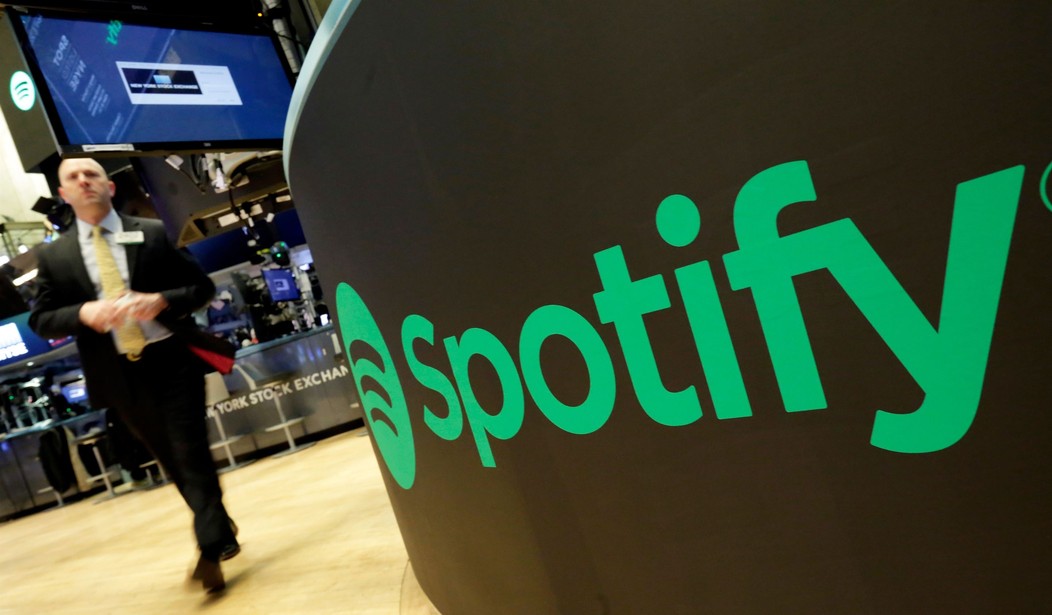The return of Voltaire! Well, sorta. This might be more encouraging if took place in the public square, rather than in those who profit from the public square. The need for Spotify CEO Daniel Ek to channel a weak-sauce Voltaire in order to curb an employee revolt yesterday over Joe Rogan’s podcast makes this somewhat less optimistic for what lies ahead in the authoritarian rush of public speakers to encourage deplatforming of others with differing viewpoints.
I’ll still take this over the latest from the Sixties, though:
Spotify CEO Daniel Ek addressed employees about the Joe Rogan controversy in a 15-minute speech yesterday, of which The Verge obtained audio, defending the company’s choice to work with Rogan, explaining its reasoning, and defining why he believes Spotify is a combination of a platform and a publisher. Employees had been skeptically awaiting the discussion at the company’s regular town hall meeting for nearly a week: since things had escalated with Joe Rogan, the company’s star exclusive podcaster, employees had been venting inside the corporate messaging system and awaiting a response from leadership about why it chose The Joe Rogan Experience over Neil Young, setting off a domino effect of other musicians and podcasters pulling content off the service. …
Ek noted that Spotify does have editorial control over the properties it owns outright, like The Ringer and Gimlet, but emphasized the distinction between those studios and Rogan. “Even though JRE is an exclusive, it is licensed content. It is important to note that we do not have creative control over Joe Rogan’s content. We don’t approve his guests in advance, and just like any other creator, we get his content when he publishes, and then we review it, and if it violates our policies, we take the appropriate enforcement actions.”
Notably, Ek did not defend Rogan’s views. “There are many things that Joe Rogan says that I strongly disagree with and find very offensive,” he said. …
“If we want even a shot at achieving our bold ambitions, it will mean having content on Spotify that many of us may not be proud to be associated with,” he says. “Not anything goes, but there will be opinions, ideas, and beliefs that we disagree with strongly and even makes us angry or sad.”
Ek didn’t even really go the Full Voltaire here. He’s offering a marketplace defense of speech as a profit center more than as a principle in itself. It’s not a bad argument to make from a platform that will need to have broad appeal to producers as well as consumers to succeed, but “think of our bottom line” doesn’t exactly rally people to a cause.
And in the event, it didn’t:
For some employees, though, Ek and the team’s sentiments rang hollow. Throughout the town hall, they messaged internally, according to screenshots viewed by The Verge, expressing disappointment with the choice Spotify made in not only signing Rogan but also in defending him. They questioned how the company considers itself a platform while still actively promoting JRE and including its logo on the cover art and how what some consider an ethical issue is being put in pure business terms.
The ethical issue connects to the business terms, even if Ek apparently didn’t connect the dots. Spotify’s business is based on free speech and debate, especially in its podcast distribution. If outside forces dictate their content, at what point will those unhappy employees start seeing their own oxes gored, only to have given up any argument to defend them? The point of a right to free speech isn’t to protect popular speech, after all, which needs no protection. It’s to ensure that unpopular speech — and perhaps truths within it, as Voltaire certainly understood its value — remain accessible.
Voltaire might also be amused by the irony of the latest protest removal at Spotify. Harry and Meghan Sussex, who have not apparently produced any content on Spotify despite inking a lucrative deal with the platform (reportedly $25 million), now wants to join the protest exit. How do you quit what you never started? Other than Neil Young and his sometimes-partners Crosby Stills & Nash, and of course Joni Mitchell, most of the rest of the free-speech opponents are barely recognizable outside of their own fiefdoms.
In all, it’s a pretty wan response, which might be even a tad more encouraging than Ek, if not a bit more inspirational. Despite all of the media attention showered on a few aging hippies from the Free Speech Movement era, most artists and producers still value actual free speech. At least for now.







Join the conversation as a VIP Member